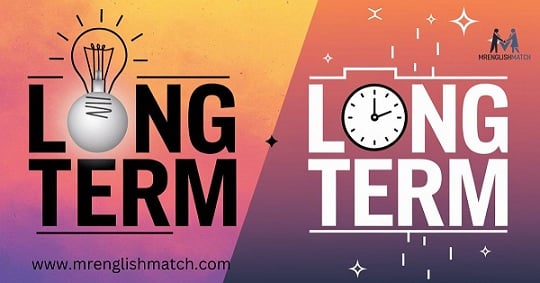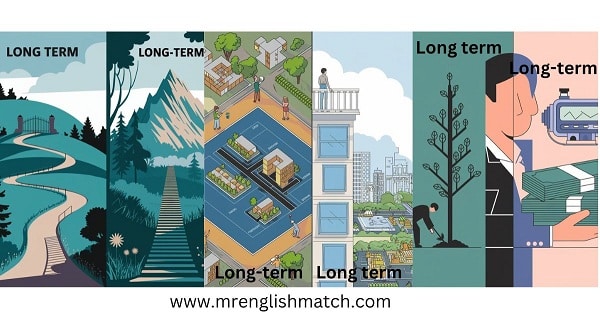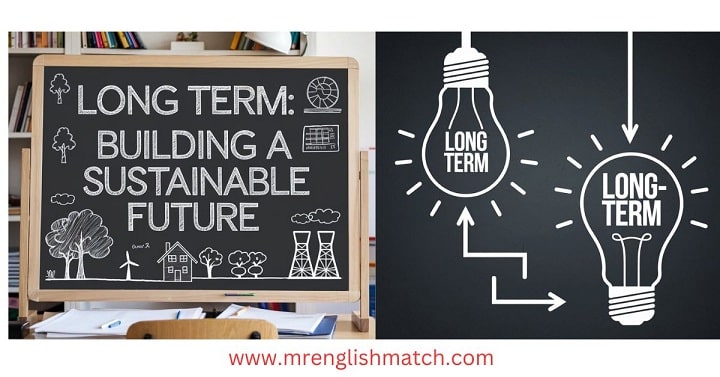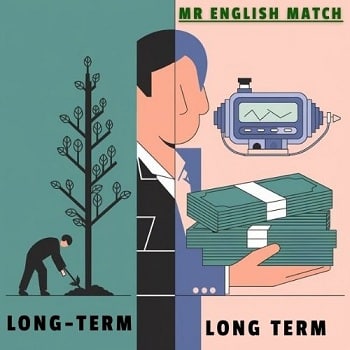When you write, knowing whether to use “long term” or “long-term”: What’s the Right Choice ,can make a big difference in how your message is understood. These two terms may seem similar, but they serve distinct roles in grammar and convey slightly different meanings. Using them correctly ensures clarity and professionalism, especially in fields like business, finance, and academia. This article will guide you through the long term vs. long-term debate, exploring their meanings, correct usage, and grammar rules to help you make the right choice in every situation.
Understanding the Basics:
Long Term or Long-Term: What’s the Right Choice
What Does “Long Term” Mean?
Long term refers to a noun phrase that indicates an extended period of time. It’s often used in contexts where the focus is on future planning, strategic thinking, or time-related concepts. When you see “long term” without a hyphen, it typically stands alone as a subject or object in a sentence.
Examples of “long term” in sentences:
- “He is focused on growth in the long term.”
- “Planning for the long term can yield significant rewards.”
- “Her investment strategy is designed with the long term in mind.”
What Does “Long-Term” Mean?
Long-term, on the other hand, is an adjective that describes something lasting for or relating to a long duration. It always appears before a noun and uses a hyphen to indicate that the two words are working together as a single descriptive unit. This form is particularly common in business, finance, and planning contexts.
Examples of “long-term” in sentences:
- “She has committed to a long-term investment strategy.”
- “The long-term effects of climate change are concerning.”
- “A long-term approach is essential for sustainable growth.”
Difference Between Long Term and Long-Term: What’s the Right Choice

The key difference lies in grammar and usage:
- “Long term” is a noun phrase. It refers to a duration of time and is often used as the object of a sentence.
- “Long-term” is an adjective. It modifies a noun and describes something that spans or relates to an extended period.
When to Use Long-Term vs. Long Term
Context Is Key
The decision to use long term or long-term depends on the role each word plays in your sentence. If you’re describing a noun—like long-term goals or long-term strategy—use the hyphenated form. If you’re referring to time itself—like in the long term—use the two-word form without the hyphen.
Examples of Usage in Sentences
| Context | Sentence Example | Correct Form |
|---|---|---|
| Describing a Strategy | “She developed a long-term plan for success.” | long-term |
| Referring to Time | “They are focused on the long term.” | long term |
| Modifying a Noun | “Their long-term investment paid off.” | long-term |
| Time as a Standalone | “We need to think about the long term.” | long term |

Grammar Rules for Long-Term and Long Term
- Use “long-term” with a hyphen before a noun as an adjective. For example, “a long-term relationship” or “long-term effects.”
- Use “long term” as a noun phrase when it follows a verb or preposition. For example, “focused on the long term” or “over the long term.”
Here’s a table comparing “long term” (with space) and “long-term” (hyphenated) with different wording and examples:
| Aspect | Long Term (with space) | Long-Term (hyphenated) |
|---|---|---|
| Grammatical Function | Acts as a noun phrase | Functions as an adjective |
| Usage | Refers to a time frame or duration | Qualifies something that lasts for an extended time |
| Example Sentence | “He is thinking about the long term.” | “They implemented a long-term plan.” |
| Position in Sentence | Generally comes after a verb or preposition | Placed directly before the noun it describes |
| Hyphenation | No hyphen needed | Must use a hyphen to connect the words |
| Common Mistake | Mistakenly used when describing an adjective | Incorrectly used when a noun phrase is required |
This table offers a clearer comparison between “long term” and “long-term” with different explanations and examples.
Quick Tip: The Hyphen Test
If you can insert the word “thing” after the phrase and it makes sense, use the hyphen:
- “Long-term thing” makes sense, so use long-term.
- “Long term thing” sounds awkward, so don’t use the hyphen here.
Examples of Long Term vs. Long-Term in Different Contexts
Business and Financial Planning
In business, knowing when to use long term vs. long-term can make a difference in reports, presentations, and strategies.
- Long-Term Goals: Companies often outline long-term goals to set a vision for the future. For instance, “Our long-term goals include increasing market share and enhancing customer satisfaction.”
- Long Term Planning: Refers to the process of looking ahead to ensure sustainability. For example, “Long term planning is crucial for navigating economic downturns.”
Academic and Professional Writing
In academic papers and reports, precision matters. Using the correct form helps convey a clear message.
- “The study focuses on the long-term impact of climate change policies.”
- “His research suggests that the benefits will be evident in the long term.”
Health and Wellness
The terms appear frequently in discussions about health, where the focus is on lifestyle changes or treatment durations.
- “Making long-term dietary changes is better for overall health.”
- “Exercising regularly can improve health in the long term.”

Common Mistakes and How to Avoid Them
Mistake 1: Using “Long-Term” When Referring to Time
One of the most common errors is using long-term with a hyphen when referring to time. This often happens because writers think of it as a standard form. However, long-term should only be used as an adjective.
- Incorrect: “He plans to invest in the long-term.”
- Correct: “He plans to invest for the long term.”
Mistake 2: Forgetting the Hyphen When Modifying a Noun
Another mistake is dropping the hyphen when using the phrase as an adjective, which can lead to awkward phrasing.
- Incorrect: “They developed a long term plan.”
- Correct: “They developed a long-term plan.”
Mistake 3: Using “Longterm” (Without a Space or Hyphen)
Longterm is not recognized as a standard word in English and is considered a typo. Always use either long term or long-term, depending on the context.
Origins and Evolution of the Terms
Origins of “Long Term”
The phrase “long term” has roots in Middle English, where “long” referred to something extended in duration, while “term” indicated a fixed period. Over centuries, it evolved to describe periods of time related to plans, strategies, and goals.
Origins of “Long-Term”
The use of “long-term” as an adjective began in the 1870s within the insurance industry. It helped specify durations of coverage in contracts. The hyphen signified that “long” and “term” functioned together to modify a noun, distinguishing it from the noun phrase.
Fun Fact
Long-term planning became popular in corporate America during the mid-20th century, as companies sought to build sustainable models for growth and competitiveness.

Synonyms and Related Terms
Synonyms for “Long Term” (Noun Phrase)
- Extended period
- Distant future
- Prolonged duration
- Long haul
- Lengthy time frame
Synonyms for “Long-Term” (Adjective)
- Enduring
- Sustained
- Chronic
- Prolonged
- Lasting
Using Synonyms to Enhance Writing
Incorporating synonyms can help vary your vocabulary and make your writing more engaging. For instance, instead of repeating “long-term goals”, you might say “sustained objectives”.
you might like also:
Pre vs Post: Which Prefix to Use?
How to Use Long Term and Long-Term Correctly in Sentences
Real-Life Example: A Case Study
Case Study: Investing for the Long Term vs. Adopting a Long-Term Strategy A financial analyst, Sarah, advises clients on investments. She emphasizes that investing for the long term focuses on future returns, while adopting a long-term strategy means implementing a specific plan that guides investment decisions over time.
- Sarah explains, “If you want to build wealth, focus on the long term. But, if you’re planning your portfolio, adopt a long-term strategy that aligns with your financial goals.”

FAQs: Clearing Up Remaining Confusion
Is “longterm” ever correct?
No, “longterm” is not correct in standard English. Stick with “long term” as a noun phrase and “long-term” as an adjective to ensure clarity and professionalism.
How can I decide quickly between “long term” and “long-term”?
If it’s describing a noun, use the hyphenated form. If it’s referring to time itself, use the two-word form.
Conclusion: Long Term vs. Long-Term—What’s the Right Choice?
The choice between long term and long-term might seem small, but it plays a big role in making your writing clear and precise. Understanding the difference between long term and long-term, following grammar rules, and applying long-term writing tips ensures you always make the right choice. Whether you’re planning for the long term or focusing on long-term objectives, using the correct form demonstrates attention to detail and helps your message stand out.
Remember: The correct usage of long term and long-term not only improves your writing but also helps you connect better with your audience. Happy writing!
This article provides a comprehensive guide, offering a deep understanding of the subject with practical examples and tips. By following the outlined advice, you can master the long term vs. long-term debate, ensuring clarity and precision in all your written communication.
Sources
Merriam-Webster (The long term Definition & Meaning),
Merriam-Webster (Long-term Definition & Meaning)

John Robert is a seasoned grammar enthusiast and the insightful voice behind MrEnglishMatch. With years of experience in language arts and a passion for clear, effective communication, John’s blog posts blend expertise with approachable advice. His deep understanding of grammar and style helps readers sharpen their writing skills and master the nuances of English. When not blogging, John enjoys exploring new languages and reading classic literature.







